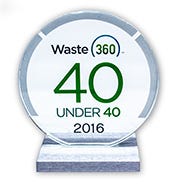Waste360 recently spoke with Shows about his current role at Advanced Disposal, what the company is focusing on for the year and what he thinks is the biggest challenge in the industry right now.
Brent Shows, Advanced Disposal Services corporate operations manager, recycling and transfer stations, has spent most of his career working in the waste and recycling industry. Over the past two years, Shows has met and exceeded the company’s annual budgets. As a leader and industry expert, he has also implemented several ideas for waste diversion.
In addition to his role at Advanced Disposal, Shows serves on the Board of the Product Stewardship Task Force, which evaluates EPR issues, legislation as it relates to recycling and other important industry trends and problems.
“Brent works very hard to be successful. After graduating from Auburn University, he has made a career for himself by working in the waste and recycling industry,” says Gentry Shows, Shows’ father. “He loves the industry, and I believe he will be a leader in the years ahead. He has a great family; he loves his wife and three children and spends all his time off with them.”
Waste360 recently spoke with the Waste360 40 Under 40 recipient about his current role at Advanced Disposal, what the company is focusing on for the year and what he thinks is the biggest challenge in the industry right now.
 Waste360: How did you get your start in the waste and recycling industry?
Waste360: How did you get your start in the waste and recycling industry?
Brent Shows: I attended Auburn University, and I graduated with a Bachelor’s degree in business management. After graduation, I started working in a management trainee role at Waste Management in Atlanta. I stayed in that role for a while, and then moved over to a role in residential and route supervision.
After I gained some experience, I left Waste Management and went to a smaller company in Alabama, which was known as Arrow Disposal at the time. I worked there as an operations manager for a couple of years, and then I transitioned into a different industry altogether for four years before accepting a role at Advanced Disposal in January of 2009.
When I first started at Advanced Disposal, I worked as an operations manager for its transfer station infrastructure in its Atlanta metro area market. After we started adding more locations, I was promoted to general manager of those new locations.
From there, I was promoted to the district manager level, where I managed all of the transfer stations in the State of Georgia. At the time, Advanced Disposal didn’t have a corporate level manager for its transfer stations and a position came open at the corporate level to manage recycling for the entire company. In August 2015, I ended up taking a role that was essentially a corporate level manager for both transfer stations and recycling, and I have been in that role since.
Waste360: Tell us about your role as corporate operations manager for recycling at Advanced Disposal and what your position entails.
Brent Shows: I assist local management in their operations, typically from a high level. I try to make quarterly visits to our 86 transfer stations and four MRFs to help each location with their individual issues. Ultimately, I play a support role to them by helping them manage their capital forecasts, labor contracts and product contracts.
I also work on creating long-term forecasts for capital spending, equipment, facility upgrades, compliance matters, etc., for each location. One of the main things I do is handle and plan for our future capital expenditures. I help all of our locations so that they are in a position to have what they need to do the job as efficiently and safely as possible.
Waste360: How have you managed to meet or exceed the company’s budget each year?

Brent Shows: When it comes to transfer stations and volumes, sometimes you have to try to reinvent the wheel. A transfer station is essentially a transfer station; you bring trash in, and you move trash out. You also have to try and figure out different ways to source separate materials. You need to think outside of the box and find different avenues for materials so that they don’t end up in landfill.
One of the most important things about budgeting is to make sure that you’re not overstepping your landfill gains. You need to evaluate the revenue and financial impact of diverting the tons from landfill to figure out the best financial decision for the company. Whether it’s diverting roofing shingles to be used as asphalt or source separating the OCC in a facility instead of it getting mixed in the material, there is always something more that can be done.
You also need to be on top of your costs and your direct cost, which is mainly labor. You have to make sure that you have the right people in the right places and that they get their job done every day. Once you get your structure in place, you also need to make sure you have responsible supervisors on your staff. Communicating with your supervisors on a daily basis is also important because you need to make sure that the company is being as efficient as it can be because it’s easy to lose track of your costs and to spiral out of control very quickly.
On the MRF side of things, you have to be aware of all of your costs at all times, especially with the fluctuating commodity prices. You need to evaluate your stream of materials and accept only what materials make sense. For those that don’t make sense, you need to find a way to make some changes so that you can keep your financials in order.
For me, I always make sure that the costs are in line and that we are taking care of both our employees and equipment. Some months will be better than others but if you ride the wave, everything will generally work out in your favor in the end.
Waste360: What is Advanced Disposal focusing on this year?
Brent Shows: Overall for Advanced Disposal, I think that we are just looking at how to get better on a day-to-day basis. We are evaluating how to provide better service, how to take better care of our employees and managing compliance and maintenance at our transfer stations, for example.
Our business has become a very competitive business, and we have to be on top of our game at all times. We are trying to take what we have and improve those things. We are finding ways to incorporate our culture into our acquisitions so that everyone is on the same page. We are also focusing on making sure that everyone has what they need and that we are providing the best service and value in the industry.
When it comes to safety, we have started installing backup brake systems and 3rd eye cameras on our commercial collection vehicles. As a company, we are definitely turning to newer technology to try and keep up with the trends. Unfortunately if you don’t have the latest technology, you will be fighting an uphill battle. In addition to those safety efforts, we have added some thermal monitoring to a few of our transfer stations.
Waste360: What do you think is the biggest challenge in the waste and recycling industry today?
Brent Shows: Some people in the industry are faced with some bad deals right now because they are contracted on rebate structures or something similar. With these deals, they are paying too much for materials and not gaining much profit. The processing costs are what they are but for the last couple of months, the pricing has been favorable. As far as commodities go, I think we have some pretty good days ahead of us if commodities continue to improve.
About the Author(s)
You May Also Like




